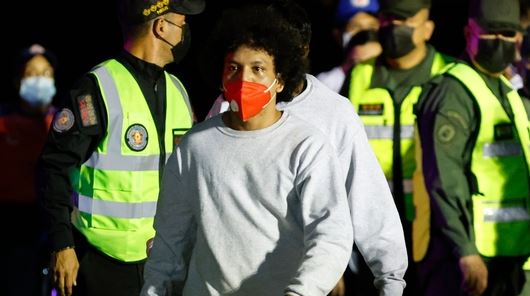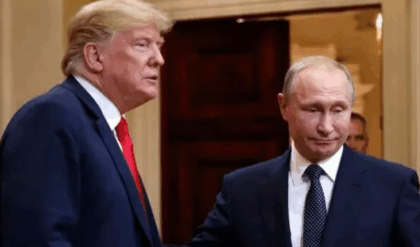In a dramatic turn of events, U.S. Immigration and Customs Enforcement (ICE) has deported Leonel Moreno, a Venezuelan national who gained notoriety as an “illegal immigrant influencer,” back to his home country. Moreno, who had been advising undocumented immigrants on how to exploit squatting laws to occupy American homes, was removed from the United States as of late March 2025. This high-profile deportation, executed under the Trump administration’s renewed immigration enforcement efforts, marks the end of a saga that sparked outrage, legal battles, and a fierce debate over immigration policy. What led to this moment, and what does it mean for the broader conversation? Let’s break it down.

Who Is Leonel Moreno?
Leonel Moreno, a 27-year-old Venezuelan, first crossed into the U.S. illegally via Eagle Pass, Texas, in April 2022. Initially enrolled in ICE’s Alternatives to Detention program—designed to monitor migrants released on parole—he quickly veered off the radar, failing to attend mandatory check-ins. By 2023, he had settled in Ohio with his wife and daughter, a U.S. citizen, and begun building a massive online following. With over 500,000 TikTok followers at his peak, Moreno dubbed himself a “migrant influencer,” using platforms like TikTok and Instagram to share provocative content.
His videos were anything but subtle. Moreno flaunted stacks of cash, claiming government handouts sustained his family—$350 a week, he boasted—and bragged about avoiding work. “I didn’t cross the Rio Grande to work like a slave,” he declared in one clip, waving hundred-dollar bills. His most infamous advice? Encouraging illegal immigrants to “invade” vacant U.S. homes and claim squatters’ rights, a legal loophole he misrepresented as a free-for-all. “If a house is not inhabited, we can seize it,” he told his audience, suggesting it as a viable “business” opportunity. The backlash was swift, but so was his rise to infamy.
The Road to Deportation
Moreno’s antics didn’t go unnoticed. ICE flagged him as an “absconder” after he ditched the Alternatives to Detention program, and his viral videos only intensified the spotlight. In March 2024, authorities caught up with him in Gahanna, Ohio, where he was arrested by ICE’s Detroit field office. Held in federal custody, Moreno faced additional scrutiny when the Bureau of Alcohol, Tobacco, Firearms and Explosives (ATF) investigated a video of him brandishing a firearm in a gun store—though no formal gun charges were confirmed.
An immigration judge ordered his deportation in September 2024, but a diplomatic standoff stalled the process. Venezuela, under President Nicolás Maduro, had halted deportation flights from the U.S. earlier that year in retaliation to renewed economic sanctions. With no direct commercial flights available since 2019, Moreno languished in detention—first in Ohio’s Geauga County Jail, then at an ICE facility in Conroe, Texas. That changed in March 2025, when the Trump administration successfully resumed deportation flights to Venezuela, clearing the way for Moreno’s exit.
His departure wasn’t quiet. Reports indicate Moreno caused a disturbance mid-flight, upsetting passengers and prompting officials to isolate him with extra security. Upon landing in Venezuela, he flashed a thumbs-up to cameras, a defiant gesture that contrasted with his earlier pleas of persecution. Venezuela’s Minister of Interior, Diosdado Cabello, welcomed him back, though details of his reception remain murky.
Why It Matters: The Public Reaction
Moreno’s case struck a nerve. His videos—mocking taxpayers, flaunting cash, and coaching others to game the system—fueled outrage among Americans already frustrated with border security. Posts on X from 2024 and 2025 reflect the sentiment: users celebrated his arrest and deportation, calling it a win against unchecked migration. “Good riddance,” one wrote, while another labeled him the “Welfare King” finally dethroned. His claim that “Papa Biden” funded his daughter’s birth only deepened the ire, amplifying calls for stricter immigration controls.
Yet Moreno’s supporters, including some Venezuelan migrants, argued he was a scapegoat. They accused the U.S. of targeting him for exposing systemic flaws, pointing to the 7.7 million Venezuelans displaced by their country’s economic collapse—a crisis dwarfing even Syria’s. “He’s just saying what others won’t,” one defender claimed online. Still, his critics—far louder—saw him as a symbol of entitlement, not victimhood.
The Bigger Picture: Policy and Precedent
Moreno’s deportation isn’t just a single story—it’s a flashpoint in America’s immigration debate. The Trump administration touted it as proof of a tougher stance, with over 335,000 Venezuelan border encounters recorded in fiscal year 2023 alone, yet only 834 deportations that year due to Venezuela’s prior refusal to cooperate. Resuming flights signals a shift, but it’s unclear how many more will follow Moreno’s path.
His squatting advice also spotlighted a real issue: adverse possession laws vary by state and are rarely as simple as he suggested. Legal experts note that squatting often involves lengthy occupancy requirements—years, not days—making Moreno’s “invasion” pitch more bluster than blueprint. Still, his rhetoric tapped into fears of property rights erosion, prompting legislative murmurs, like a proposed bill to make squatting a deportable offense.
Health and welfare debates echo here too. While Moreno flaunted handouts, data shows SNAP households (a program RFK Jr. wants to reform) buy nutritious food at rates comparable to others. His case raises questions: Should aid come with strings? And how much does social media amplify these tensions?
What’s Next?
For Moreno, Venezuela awaits—a nation in turmoil where his “influencer” skills may find less fertile ground. For the U.S., his deportation is a headline, not a solution. With millions of migrants in limbo and border policies under scrutiny, this saga underscores the clash between enforcement and empathy, optics and outcomes.
So, what do you think? Was Moreno’s removal justice served or a distraction from bigger issues? His story—equal parts audacity and absurdity—leaves no easy answers, but plenty to unpack. Share your take below; the conversation’s just getting started.





